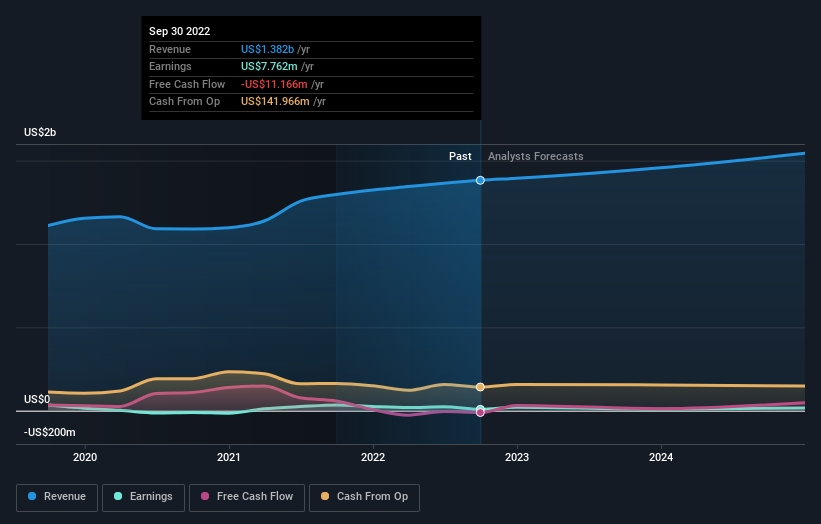- United States
- /
- Healthcare Services
- /
- NasdaqGM:RDNT
Investors more bullish on RadNet (NASDAQ:RDNT) this week as stock climbs 6.4%, despite earnings trending downwards over past five years

When you buy a stock there is always a possibility that it could drop 100%. But when you pick a company that is really flourishing, you can make more than 100%. One great example is RadNet, Inc. (NASDAQ:RDNT) which saw its share price drive 121% higher over five years. On top of that, the share price is up 28% in about a quarter. But this could be related to the strong market, which is up 12% in the last three months.
Since the stock has added US$75m to its market cap in the past week alone, let's see if underlying performance has been driving long-term returns.
View our latest analysis for RadNet
To quote Buffett, 'Ships will sail around the world but the Flat Earth Society will flourish. There will continue to be wide discrepancies between price and value in the marketplace...' One way to examine how market sentiment has changed over time is to look at the interaction between a company's share price and its earnings per share (EPS).
RadNet's earnings per share are down 10% per year, despite strong share price performance over five years.
Essentially, it doesn't seem likely that investors are focused on EPS. Since the change in EPS doesn't seem to correlate with the change in share price, it's worth taking a look at other metrics.
On the other hand, RadNet's revenue is growing nicely, at a compound rate of 8.7% over the last five years. It's quite possible that management are prioritizing revenue growth over EPS growth at the moment.
The company's revenue and earnings (over time) are depicted in the image below (click to see the exact numbers).

This free interactive report on RadNet's balance sheet strength is a great place to start, if you want to investigate the stock further.
A Different Perspective
We regret to report that RadNet shareholders are down 9.3% for the year. Unfortunately, that's worse than the broader market decline of 7.0%. Having said that, it's inevitable that some stocks will be oversold in a falling market. The key is to keep your eyes on the fundamental developments. Longer term investors wouldn't be so upset, since they would have made 17%, each year, over five years. It could be that the recent sell-off is an opportunity, so it may be worth checking the fundamental data for signs of a long term growth trend. It's always interesting to track share price performance over the longer term. But to understand RadNet better, we need to consider many other factors. To that end, you should learn about the 5 warning signs we've spotted with RadNet (including 1 which is a bit unpleasant) .
If you would prefer to check out another company -- one with potentially superior financials -- then do not miss this free list of companies that have proven they can grow earnings.
Please note, the market returns quoted in this article reflect the market weighted average returns of stocks that currently trade on US exchanges.
New: AI Stock Screener & Alerts
Our new AI Stock Screener scans the market every day to uncover opportunities.
• Dividend Powerhouses (3%+ Yield)
• Undervalued Small Caps with Insider Buying
• High growth Tech and AI Companies
Or build your own from over 50 metrics.
Have feedback on this article? Concerned about the content? Get in touch with us directly. Alternatively, email editorial-team (at) simplywallst.com.
This article by Simply Wall St is general in nature. We provide commentary based on historical data and analyst forecasts only using an unbiased methodology and our articles are not intended to be financial advice. It does not constitute a recommendation to buy or sell any stock, and does not take account of your objectives, or your financial situation. We aim to bring you long-term focused analysis driven by fundamental data. Note that our analysis may not factor in the latest price-sensitive company announcements or qualitative material. Simply Wall St has no position in any stocks mentioned.
About NasdaqGM:RDNT
RadNet
Provides outpatient diagnostic imaging services in the United States and internationally.
Adequate balance sheet and fair value.
Similar Companies
Market Insights
Community Narratives



